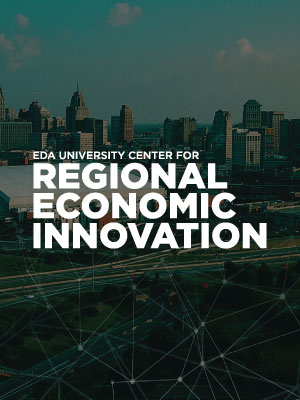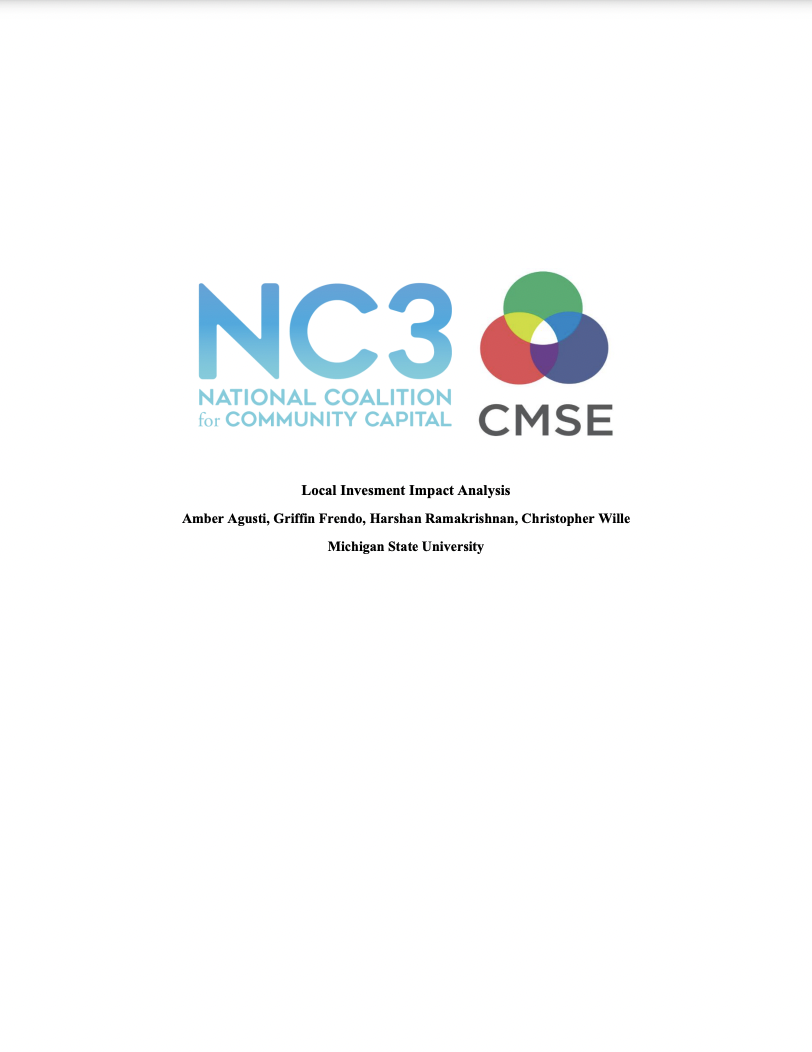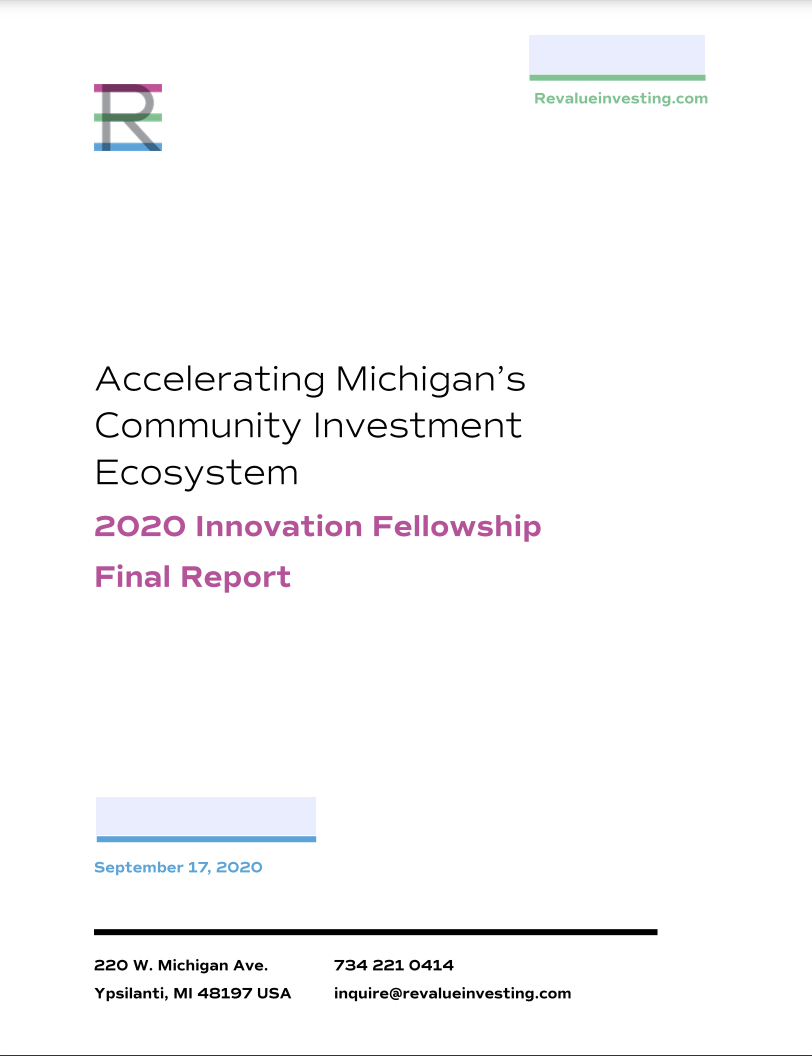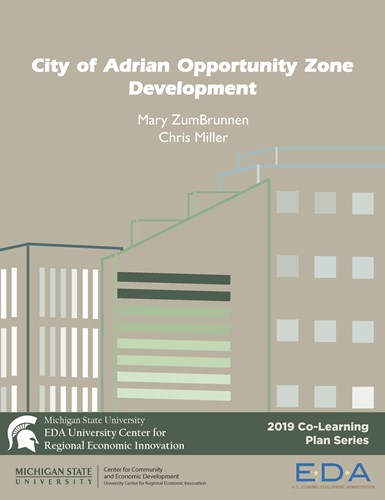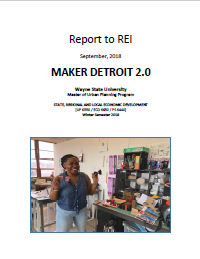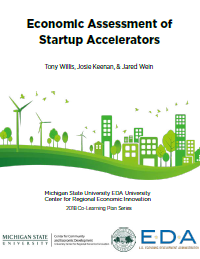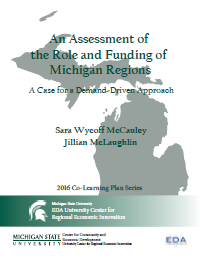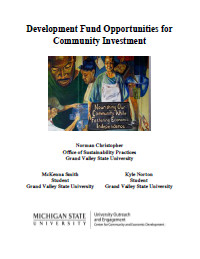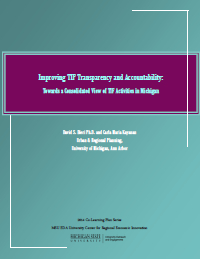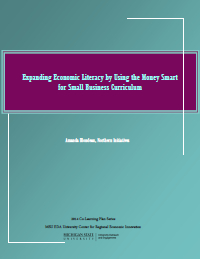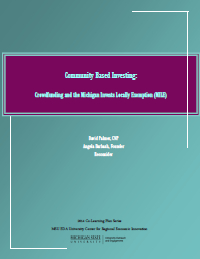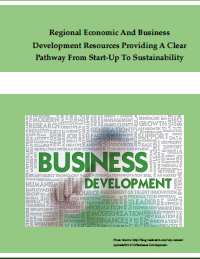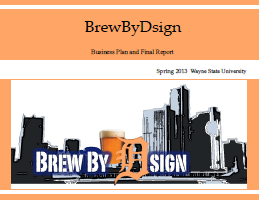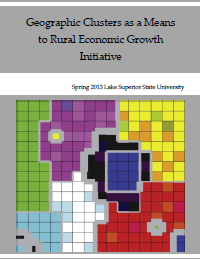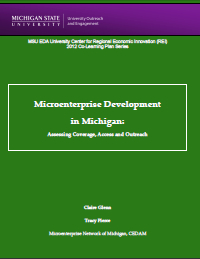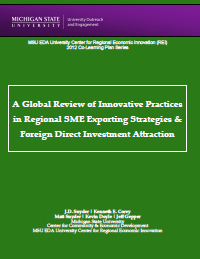Discovering and applying new and innovative economic development tools, models, policies, and programs
Creating Jobs and Wealth in Distressed Michigan Communities
Finance, Legal, and Exporting
-
2024: Strategy to Develop a Diversified Community Investment Fund
Author(s): Melissa DavisRead the Report About the ProjectThis Co-Learning Plan project seeks to reverse the habitual outsourcing of dollars back to the main streets of Houghton and Keweenaw counties in Michigan's Upper Peninsula, where many locally-owned businesses have gradually shuttered throughout the last five decades. It proposes to introduce people to crowd-capitalization, build infrastructure for large community conversations, and use knowledge gained to establish a local Diversified Community Investment Fund.
-
2023: Local Investment Impact Analysis Project
Author(s): Amber Agusti, Griffin Frendo, Harshan Ramakrishnan, Christopher WilleRead the Report About the ProjectLocal investing, which involves individuals investing in businesses within their community, can have a significant impact on small businesses. This type of investment not only provides much-needed capital but also helps build stronger relationships between businesses and their local community. By investing in local businesses, individuals can help create jobs, support economic growth, and foster a sense of community ownership. Moreover, local investing can be a powerful tool for small businesses looking to expand their reach and attract new customers. However, it's important to note that local investing is not without its risks, and investors should carefully evaluate each opportunity before committing their funds. This paper will analyze all these factors that went into investing in local businesses with the usage of Machine Learning algorithms to analyze these factors.
-
2022: Regional Tax Base Sharing
Author(s): Ashley BellantRead the Report About the ProjectRegional Tax Base sharing has arisen as one tool to address urban sprawl and the fiscal disparities created and exacerbated by the phenomenon. This Co-Learning Plan focuses on Resiliency Planning and Financial Resiliency. It will examine the history of Michigan’s shrinking urban cores, introduce regional tax base sharing, present two case studies from Minneapolis-St. Paul, MN and The Meadowlands, NJ where regional tax base sharing has been implemented, introduce a fiscal disparities calculation that can be applied to any hypothetical municipality and discuss its use, provide talking points for proponents of regional tax base sharing, and include a roadmap detailing the policy and legal steps needed to adopt and implement regional tax base sharing in our state. This Co-Learning Plan aims to inform and stimulate discussion amongst residents, advocates, and policymakers of a new idea meant to address inequities.
-
2022: Exploring Communal and Cooperative Investment Models for Lansing
Author(s): Tony WillisRead the Report About the ProjectThe United Way, in collaboration with other philanthropic institutions, has created a new measure known as ALICE, which stands for “Asset Limited, Income Constrained, Employed”, and represents the growing number of households in our communities that are above the federal poverty limit but do not earn enough to cover all their monthly household necessities. Contributing to this issue is growing wealth gap between Black and White households. It is imperative that economic developers create and deploy new programs that can assist those who are most susceptible to financial misfortune and economic immobility. Equitable Economic Development unlocks the full potential of the local economy by dismantling barriers and expanding opportunities for low-income people and communities of color. Through accountable public action and investment, it grows quality jobs and increases entrepreneurship, ownership, and wealth. The result is a stronger, more competitive community. This Innovation Fellowship will focus on exploring communal and cooperative investment/business models, specifically worker-owner cooperatives and community investment trust, that could be deployed in the Lansing region to combat the economic instability that has become prevalent within the last decade. Both models provide pathways for increased income and asset acquisition that position owners/community members with a greater chance to grow wealth.
-
2021: Virtue and Policy in the Michigan Circular Economy
Author(s): Jacob NamovichRead the Report About the ProjectThe subject of this Co-learning Plan is an investigation into the role that the U.S. government can play in circular economy (CE) transitions. The project works to consolidate existing international work in the field by studying transition strategies and determining transferable knowledge that can be employed in the U.S. to compliment top-down decarbonization efforts. It will explore the actors driving these transitions, the policies promoting their emergence, and the literature arguing their calculation. The study will achieve this by conducting 1) literature reviews of non-U.S. and U.S. progress in manifesting a CE transition; and 2) outreach with personnel who have engaged in CE transition tools and methodologies. Findings will be consolidated into a published report and resources discovered along the course of the project will make up an appended annotated bibliography.
-
2020: Wayne State University Financial Capability Pilot
Author(s): Matthew Roling and Julie HollinsheadAbout the ProjectWayne State University (WSU) had a unique opportunity to develop a financial capability pilot which will positively impact its students, particularly those with acute needs. Due to the economic fallout from COVID-19, students are experiencing stress related to shrinking financial resources, student loans and other personal issues. They are disproportionately impacted by COVID-19 with employment loss in the food and beverage and restaurant industries. An estimated 51% of WSU undergraduates were in the LMI income bands in 2019. The proportion of LMI undergraduates in 2020 is likely higher given university-wide initiatives like the Heart of Detroit Tuition Pledge, which offers free tuition for graduates of Detroit high schools or Detroit residents earning a high school diploma in 2020.
A financial capability initiative gives students access to financial tools and qualified individuals who can support, guide and enable them to organize and stabilize their lives financially and get on the road to financial security. The purpose of this project was to help pilot an innovative solution to help students gain the skills they need to help them become financially independent. -
2020: Community Capital Investing: Mapping the Ecosystem
Author(s): Angela BarbashRead the Report About the ProjectAs part of an informal coalition in Michigan working toward a future where community capital is ubiquitous and universally normalized, Revalue (project lead, Angela Barbash) would like to take responsibility for mapping the current ecosystem of people, organizations, and resources that make up the current marketplace. Present their findings to a coalition of 40 members and make the information publicly available via a variety of mediums (blog post, a recorded webinar, press engagement, and an easy to share infographic). They would like also like to take the opportunity to draft a program concept for other leaders who would like to develop a community investment market in their town or region. This project would pave the way for future funding opportunities by other coalition members or by MSU REI and Revalue as joint sponsors.
-
2019: Marrying Community Benefits and Development Practice
Author(s): Sam Butler, Doing Development Differently in Detroit (D4) and Francis Grunow, ConsultantRead the Report About the ProjectAfter exhaustive study and evaluation, D4 has concluded that in order for community benefits to be effective in Michigan, they need to be embedded early in the development process. But how to effect these policies without driving away private investment remains a key question. Building from previous preliminary research, D4's project will describe recommendations for how to insert community benefit provisions into standard development processes, including RFPs, TIFs, and incentive overlay districts.
-
2019: Bring Opportunity Zones and Local Investors Together in Your Community
Author(s): Mary ZumBrunnen and Chris Miller, City of AdrianRead the Report About the ProjectThis Co-Learning Plan focused on developing best practices for a small Opportunity Zone within the City of Adrian concentrating on fund development and attraction. Within an Opportunity Zone, investors may receive capital gains relief in low-income census tracts of distressed communities. As such, historical and current barriers to investment must be overcome with best practices unique to their region identified. Working with a host of national, state, and local partners, the City created is disseminating this resource toolkit for small cities identified for this type of social investment.
-
2018: Highlighting the Hustle: Exploring the Underground Economy in Detroit
Author(s): Rita Fields, University of MichiganRead the Report About the ProjectEconomic development initiatives targeting entrepreneurs have found Detroit to be a ripe breeding ground for talent, and for those entrepreneurs who are able to participate in those programs this has been a time of great fortune. The reality, though, is that these programs are not open to all who desire to ascend to the entrepreneurial ranks. For a multitude of reasons that need to be further identified and explored, some aren't able to take advantage of this opportunity. For some entrepreneurs, transitioning from being 'off the books' (or, as referred to in the title, underground) to 'on the books' would result in a significant pay cut due to the costs of conducting business. The research proposed in this study will focus on the definition of the underground economy, identification of susceptible participants, barriers of entry that have prevented participants of the underground economy from engaging in standardized entrepreneurial development, an attempt to quantify the potential economic impact of the underground economy in the region and why a commitment to reconnect that effort to the overall impact benefits the region and propose recommendations on how funders can be more inclusive in their funding guidelines.
-
2018: Assessment of the Maker Economy in Detroit
Author(s): Robin Boyle, Wayne State UniversityRead the Report About the ProjectFor many commentating on national trends, the 'maker economy' is a network of inventors, artisans and entrepreneurs dedicated to designing and making, and being committed to the places where they live. The maker economy has been encouraged by and employs new technologies and systems that in the past facilitate individuals or small businesses to design, make and merchandise products and services that were only available to larger business entities. The proposal as outlined builds off a metropolitan-wide study of the emerging maker economy conducted in UP 6550 - Introduction to Local Economic Development, an elective course in the WSU Master of Urban Planning program. This work, completed by 20 graduate students (under the guidance of Professor Robin Boyle) in the winter semester (Jan-April) 2017 addressed whether a 'maker economy has developed in Southeast Michigan, particularly Detroit, who are the "maker" enterprises, what support systems ("enablers") exit to assist emerging or growing firms identified in the maker economy and what are the perceived gaps in the services; supports provided by the facilitators; support organizations?
-
2018: A Study of the Economic Impact of Startup Accelerator Programs
Author(s): Tony Willis, TAAW Consulting; Josie Kennan; Jared Wein, MozillaRead the Report About the ProjectThe most common way to define a Startup Accelerator is a fixed-term, cohort based program that includes outlined objectives for the participants, industry expertise (mentorship), educational components, an exchange of funding for equity, and culminating in a "Demo Day." With the successful increase in accelerator programs, many communities, universities, and other entrepreneurial support organizations across the nation have decided to either create or replicate accelerator models in their own communities with hopes of having similar success. Despite the upsurge in visibility and glamorization of the startup lifestyle coupled with the successes of notable startups who were alumni of named accelerators, there is no study which illustrates the actual economic impact a startup accelerator has on its local region. This Co-Learning Plan will examine this popular economic development tool and its impact on Michigan communities and regions.
-
2017: Impact of Michigan’s “Dark Store” Method of Property Taxation and Potential Solutions
Author(s): Sitou Akibode and Mark Skidmore, Michigan State UniversityRead the Report About the ProjectRecent successful big box tax appeals in Michigan have led to halving their tax base. This drastic reduction in the tax base, and consequently tax revenue to local governments, has led to budget shortages in local governments. This study helps not only to understand and assess the impact of the big box tax abatement on local communities, and governments, but also explores new forms of collaboration between communities and big box stores, including community benefits agreements (CBAs).
Project Updated As Of September 30th, 2017
-
2016: An Assessment of the Role and Funding of Michigan Regions: A Case for a Demand-Driven Approach
Author(s): Sara Wycoff McCauley & Jillian McLaughlin, Strategic Policy ConsultantsRead the Report About the ProjectOver the coming years, policymakers will face the challenge and opportunity of defining what is next for the state's regional efforts in economic development. This Co-Learning Plan focused on the existence and implication of regional funding models for Michigan. The authors identified funding tools available in Michigan for regional economic development, performed a comparative analysis with other states, and made recommendations for policymakers based on the findings.
Project Updated As Of September 30th, 2016
-
2015: Investing in Community Improvement: Southtown Neighborhood, Grand Rapids
Author(s): McKenna Smith and Kyle Norton, Grand Valley State UniversityRead the Report About the ProjectThe Seeds of Promise organization and in partnership with Grand Valley State University, tries to empower residents with limited means to create benefit from investing in their community's improvement. This project designed a 'mutual fund' model and deployment strategy for the Seeds Southtown Neighborhood that can be readily repeated. The profits from the community investment were paid back to residents, based on their shares, and this process helped reduce retail leakage for this area.
Project Updated As Of September 30th, 2015
-
2014: Improving TIF Transparency and Accountability: A Consolidated TIF Database for Michigan
Author(s): David Bieri, Ph.D., University of MichiganRead the Report About the ProjectThe Co-Learning Plan addresses the implementation of a database to track the effects of TIFs, as Dr. Bieri points out; there is an "absence of standardized information for making meaningful fiscal comparisons" in Michigan.
Project Updated As Of September 30th, 2014
-
2014: Expanding Economic Literacy by using the Money Smart for Small Business Curriculum
Author(s): Amanda Blondeau, Northern InitiativesRead the Report About the ProjectThis Co-Learning Plan proposed to develop training videos based on the 10 training areas of the FDIC Money Smart for Small Business program. Assessments were built in and pre/post-tests examined whether learning took place. The videos are now available at http://www.northerninitiatives.org/business-services/small-business-videos/
Project Updated As Of September 30th, 2014
-
2014: Community Based Investing: Crowdfunding and the Michigan Invests Locally Exemption
Author(s): Angela Barbash, ReconsiderRead the Report About the ProjectThis Co-Learning Plan created a curriculum of investment readiness education and crowdfunding. The curriculum helped businesses in understanding what potential investors will want to know and help them identify the appropriate capital sources for small businesses. It also explained the provisions of the new MILE law (Michigan Invests Locally Exemption).
Project Updated As Of September 30th, 2014
-
2013: Regional Economic and Business Development Resources Providing a Clear Pathway from Start-Up to Sustainability
Author(s): Matt Matteson, Jim Baker, Jonathan Leinonen, Michigan TechRead the Report About the ProjectMapping of regional economic and business development resources and gaps with contextual overlay of company stage. This project identified needs and availability of resources for early stage companies. The focus of the project was technology companies in the western Upper Peninsula yet was highly relevant to other regions as they create multi-year plans for growth.
Project Updated As Of September 30th, 2013
-
2013: Navigating the Business Permit Process in Detroit
Author(s): Wayne State UniversityRead the Report About the ProjectWorking in teams, students developed a series of different profiles reflecting a range of small businesses in Detroit. They selected locations and buildings to house and grow their respective businesses then, in a form of role playing, sought out the full range of permits required to start the new operation. Each team was asked to assess the routes through and between these bureaucracies, illustrating the processes where possible. The goal of each team was to assess the key challenges they identify on their journey and make relevant and appropriate recommendations for change.
Project Updated As Of September 30th, 2013
-
2013: Geographic Clusters as a Means to Rural Economic Growth Initiative
Author(s): Ralf Wilhelms, Lake Superior State UniversityRead the Report About the ProjectThis project examines a rural regional cluster in terms of geographical setting rather than in terms of the common industry categorizations. The purpose of this student-led, faculty guided project was to create an online cooperative website to highlight products from Eastern UP manufacturing firms.
Project Updated As Of September 30th, 2013
-
2012: Microenterprise Development in Michigan: Assessing Coverage, Access and Outreach
Author(s): Claire Glenn, Tracy Pierce, Microenterprise Network of MichiganRead the Report About the ProjectMicroenterprise development supported entrepreneurs and businesses that contribute to vibrant neighborhoods, strong communities, and stable local economies. This Co-Learning Plan showcased research assessing Michigan's microenterprise ecosystem and the avenues for entrepreneurs to connect to assistance. It featured the launch of a new online resource directory.
Project Updated As Of September 30th, 2012
-
2012: A Global Review of Innovative Practices in Regional SME Exporting Strategies and Foreign Direct Investment Attraction
Author(s): J.D. Snyder, Kenneth E. Corey, Michigan State UniversityRead the Report About the ProjectThis Co-Learning Plan describes findings from the MSU Center for Community and Economic Development based on research conducted at a global scale to identify innovative practices in regional exporting strategies and foreign direct investment (FDI) attraction.
Project Updated As Of September 30th, 2012


